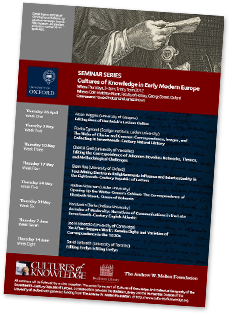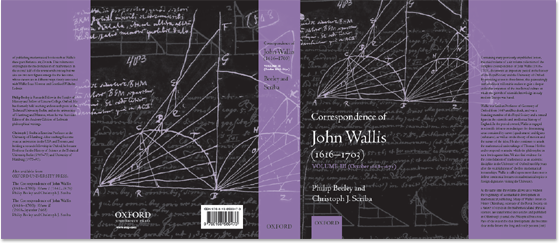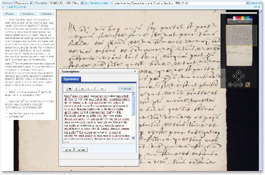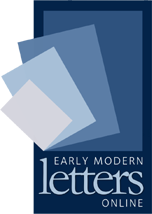* You are viewing the archive for March, 2012
James Brown
March 29, 2012
Events, Lectures, Project Updates
 We are delighted to share the programme for the third and final Project seminar series. Entitled Cultures of Knowledge in Early Modern Europe, and this year convened by Howard Hotson (following sterling work by Pietro Corsi and Peter Harrison on the 2010 and 2011 cycle), the series assembles yet another glittering cast of eight authorities on early modern letters and correspondence. As ever, our speakers will range widely over the topic, providing status updates on world-renowned editions, rich historical case studies, state-of-the-art digital approaches, and theoretical reflections that encourage us to think differently about early modern epistolarity. Podcasts and write-ups from the 2010 and 2011 series will give you a flavour of the talks; for exciting discussion, slides, and an opportunity to engage with speakers informally over wine and nibbles following their papers, you are welcome to join us.
We are delighted to share the programme for the third and final Project seminar series. Entitled Cultures of Knowledge in Early Modern Europe, and this year convened by Howard Hotson (following sterling work by Pietro Corsi and Peter Harrison on the 2010 and 2011 cycle), the series assembles yet another glittering cast of eight authorities on early modern letters and correspondence. As ever, our speakers will range widely over the topic, providing status updates on world-renowned editions, rich historical case studies, state-of-the-art digital approaches, and theoretical reflections that encourage us to think differently about early modern epistolarity. Podcasts and write-ups from the 2010 and 2011 series will give you a flavour of the talks; for exciting discussion, slides, and an opportunity to engage with speakers informally over wine and nibbles following their papers, you are welcome to join us.
Seminars take place in Trinity Term 2012 on Thursdays at 3-5pm in the Faculty of History‘s light and airy Colin Matthew Room. For the full programme and further details, please see the seminar webpage. The seminar poster (pdf) can be downloaded on the right.
James Brown
March 27, 2012
Front Page, Project Updates, Publications, Videos
Tags: Editions, Europe, History of Science, John Wallis, Mathematics, Networks, Seventeenth Century

We are pleased to report that Volume III of The Correspondence of John Wallis (1616-1703) – one of a number of epistolary editions the Project is supporting, and the latest installment of the prestigious multi-volume edition of the mathematician’s letters – is now available for pre-order from Oxford University Press, pending publication in May. Painstakingly crafted by our Research Fellow Philip Beeley in conjunction with Christoph J. Scriba, work on the third volume began in the context of the AHRC-funded Wallis Project, and has been completed under the auspices of Cultures of Knowledge.
Consisting of 254 letters in total, the volume covers the exciting period 1668 to 1671, during which England was at peace with itself and its neighbours, publication techniques were becoming ever-more sophisticated (especially with the emergence of academic journals), and scientific activity thrived across the continent. It finds Wallis embroiled in fascinating debates on techniques for determining areas contained by curves (quadratures) and figures (cubatures), as well as on theories of motion and the nature of tides. Other volume highlights include Wallis’s celebrated disputes with Thomas Hobbes and French mathematician François Dulaurens, and ceremonial visits to Oxford by the Crown Prince of Tuscany and William of Orange, during which – in telling evidence of rapid disciplinary consolidation – Wallis presented the visiting dignitaries with examples of state-of-the-art geometrical thinking. Below, Philip discusses the latest installment and looks ahead to Volume IV, which will be delivered in the summer.
For further publication details and to pre-order your copy, please visit the OUP website. For background information about Wallis and other outputs emerging from this sub-project (including podcasts, video, and a complete catalogue of Wallis’s extensive correspondence within Early Modern Letters Online), head along to the Wallis webpage.
As part of their recent strategic alliance with Queen Mary, University of London, the Centre for the Study of the Renaissance at the University of Warwick has announced two Postdoctoral Research Fellowships, one based at Queen Mary and one at Warwick, on the theme of ‘Networks and Information Technologies, 1300-1800’. To form part of the collaborative project ‘Rewiring the Renaissance: Cultural Networks and Information Technologies’, the Fellows will explore modes of communication and networking in the Renaissance period, from letter writing to orality, and develop IT-led modern mechanisms which can capture and analyse the Renaissance communities that were constructed. Projects that explore cultural transmission in any media or European language are welcome; in addition, the Queen Mary Postdoctoral Research Fellow will be expected to have the skills that will allow for an interrogation of the ways in which we communicate historical information in a digital world.
The deadline for applications is Friday, 11 May 2012. For background information on the collaboration, further details about the two posts, and to apply, please visit the project webpage. Please send informal enquiries to Dr Penny Roberts.

Having stumbled across a discussion, inter alia, of early modern sleep and nocturnal activity in an article on the BBC News website, I found myself deep in EMLO this week on the elusive trail of sleeping patterns and experiences. As you might expect, cacophonous night-time irritants – cockerels, ostlers ‘scraping horses down and removing stones from their hooves’, fellow academics and students discoursing in the small hours – conspired to rob the worthy of their peace at night. We find poor Comenius and Johan Christoph Wolf suffering from insomnia, the latter ‘prostrated’ as a result. Sir John Cotton records being ‘indisposed for want of sleep’, and Narcissus Marsh finds himself so overworked he is rendered ‘unable to stand without help and more fit to sleep than write’. Dutch scholar and poet Nicolaas Heinsius the elder deserves our sympathy. Clearly a poor sleeper, he makes repeated reference to sleeplessness in letters spanning from 1650 to 1680, and the problem seems to have become especially acute towards the end of his life. Had he known of her, he might have envied the unfortunate unnamed woman, the subject of a curious case recorded in 1723, who slept ‘continuously for more than 6 weeks’ (presumably she was in some sort of coma).
Tips and recommendations for more effective slumber abound. To aid sleep, I found remedies of a cowslip mixture prescribed by Sir Hans Sloane to a long-suffering patient, and advice to Arthur Charlett, should he wish to sleep during the day, to indulge himself but to ‘sleep in a chair & not lying down’. The best counsel, however, came from none other than our own Jan Amos Comenius who, in a letter to a young man called Jindřich Dobříkovský, suggested dividing the day, taking eight hours for sleep, eight for work and study, and eight for recreation. All wonderfully wholesome and wise. As late as 1785, John Scott Hylton was writing to the Reverend Mark Noble with rules for ‘healthy living (light supper, bed and asleep by 11: nocturnal studies as bad as nocturnal revels)’. No excuse, then, for either of these gentlemen dropping off in the library.
Miranda is editing metadata from the Bodleian card catalogue of correspondence for our union catalogue Early Modern Letters Online. On a regular basis, she brings us hand-picked and contextualised records.
Snooze Button
 A beta version of the correspondence of the sixteenth-century naturalist Carolus Clusius (1526-1609), developed by the Huygens ING (KNAW) and the Scaliger Institute (Leiden University Libraries), is now available online. Created with eLaborate, the online transcription platform developed by Huygens ING, the site currently features fully searchable transcriptions of 450 letters, but metadata on all known letters together with scans of 1,300 letters in the Leiden University Library are also included. Scholars in the field of the history of science, students of languages and paleography, and anyone seriously interested in the history of botany are invited to participate in the ongoing refinement of the resource, contributing new transcriptions, or improving existing texts. For further information and a link to the beta, please visit the Project webpage.
A beta version of the correspondence of the sixteenth-century naturalist Carolus Clusius (1526-1609), developed by the Huygens ING (KNAW) and the Scaliger Institute (Leiden University Libraries), is now available online. Created with eLaborate, the online transcription platform developed by Huygens ING, the site currently features fully searchable transcriptions of 450 letters, but metadata on all known letters together with scans of 1,300 letters in the Leiden University Library are also included. Scholars in the field of the history of science, students of languages and paleography, and anyone seriously interested in the history of botany are invited to participate in the ongoing refinement of the resource, contributing new transcriptions, or improving existing texts. For further information and a link to the beta, please visit the Project webpage.
On Thursday 3 May Florike Egmond from the Clusius Project will be sharing a paper on Clusius, collecting, and practices of scientific illustration in our third annual seminar series. For her talk and seven other exciting contributions, please visit the seminar webpage.
 We are delighted to share the programme for the third and final Project seminar series. Entitled Cultures of Knowledge in Early Modern Europe, and this year convened by Howard Hotson (following sterling work by Pietro Corsi and Peter Harrison on the 2010 and 2011 cycle), the series assembles yet another glittering cast of eight authorities on early modern letters and correspondence. As ever, our speakers will range widely over the topic, providing status updates on world-renowned editions, rich historical case studies, state-of-the-art digital approaches, and theoretical reflections that encourage us to think differently about early modern epistolarity. Podcasts and write-ups from the 2010 and 2011 series will give you a flavour of the talks; for exciting discussion, slides, and an opportunity to engage with speakers informally over wine and nibbles following their papers, you are welcome to join us.
We are delighted to share the programme for the third and final Project seminar series. Entitled Cultures of Knowledge in Early Modern Europe, and this year convened by Howard Hotson (following sterling work by Pietro Corsi and Peter Harrison on the 2010 and 2011 cycle), the series assembles yet another glittering cast of eight authorities on early modern letters and correspondence. As ever, our speakers will range widely over the topic, providing status updates on world-renowned editions, rich historical case studies, state-of-the-art digital approaches, and theoretical reflections that encourage us to think differently about early modern epistolarity. Podcasts and write-ups from the 2010 and 2011 series will give you a flavour of the talks; for exciting discussion, slides, and an opportunity to engage with speakers informally over wine and nibbles following their papers, you are welcome to join us.





 Join
Join 